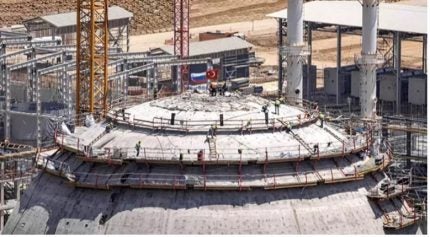
Commissioning of unit 1 at the Akkuyu NPP under construction in Türkiye is under way and it is expected to be commissioned in April 2025, according to Denis Sezemin, Director for Construction & Organisation of Production at project company Akkuyu Nukleer.
Akkuyu, Türkiye’s first NPP, will eventually host four Russian-designed VVER-1200 reactors. The pouring of first concrete for unit 1 took place in April 2018, for unit 2 in June 2020, for unit 3 in March 2021, and for unit 4 in July 2022. Rosatom is constructing the reactors according to a build-own-operate model.
“According to the inter-governmental agreement, we have seven years [before the start of commercial operation]. We received a construction licence for unit 1 in April 2018, so the date of its commissioning is presumably April 2025,” Sezemin said. “At unit 1, most of the main construction and installation works have been completed, commissioning of all equipment and systems is underway.”
He added that work is being carried out “in full accordance with the previously approved schedule”. He explained that “an operation is being carried out to tension special steel cables for the reactor containment” and installation of the fuel loading machine is underway.
“The main parts of the turbine unit are located in the turbine room. They are located in the places provided for by the design project. Pipeline installation is underway; we will install a total of 3,000 tonnes of pipes. In addition, work is continuing at other NPP facilities. Some of the work is at the final stage including a water treatment station, a sea water purification station and laboratories.”
He likened the NPP to a puzzle, noting that at this stage “the collection of the remaining pieces is coming together”. All work is strictly checked by the Turkish Nuclear Regulatory Council and other organisations. “We are currently testing the start-up and adjustment of all equipment, systems, so that the plant can produce electricity for 60 years and the life of the plant can be extendedsafely for a further 20 years.”






